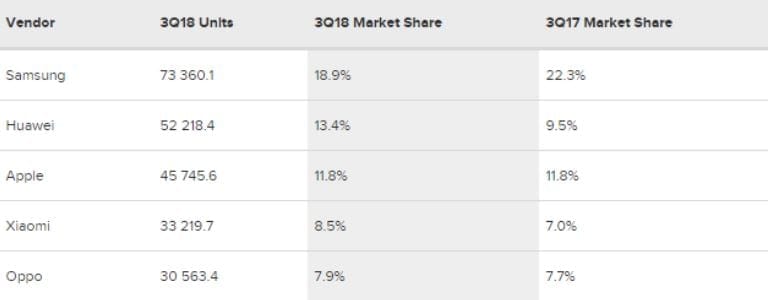Increasing the global competitiveness of US businesses has been one of the primary goals of the current administration, mainly by first strengthening their position in the domestic market. The tools used to that end included tariffs on steel & aluminum imports to protect the US auto industry, for which the President cited national security as his reason. His most drastic measure was imposing sanctions on Huawei. The harsh nature of those sanctions and Huawei’s involvement in the 5G mobile network technology are two reasons for why this last measure deserves a closer look.
It’s difficult to divorce the concerns surrounding Huawei from the overarching conflict of trade interests between China and the US. The main worry is the tight relationship between major Chinese corporations and their national government. If there’s even the faintest chance of using smartphones for surveillance, we can be be sure there’s someone interesting in taking advantage of it. Fortunately at this point there’s no evidence to support those fears. That being said, it’s still worth pointing out that among the world’s five largest cell phone manufacturers there are three Chinese companies, one South-Korean company and Apple is the only brand representing the US.

Source: https://businesstech.co.za/news/mobile/291286/top-5-best-selling-smartphone-brands-in-the-world-2/
Looking at the above chart we can see that Huawei took 2nd place from Apple in 2018, who’s now barely holding on tho 3rd. Although Chinese companies are mostly gaining ground at Samsung’s expense, they’ve also significantly reduced Apple’s market share.
It’s worth noting that most of these Chinese phones use the Android operating system, so while the country has developed an impressive advantage in terms of hardware, the product’s nerve center is still controlled by a US company. This begs the question of whether the theoretical mobile phone surveillance system mentioned earlier can only be developed using software or if there’s a hardware based route for it. If it’s the former, then the most powerful tool for gathering information is none other than Google, which remains firmly US based. Securing their cooperation would certainly give the US an edge over China.
Most likely these matters of national security aren’t strictly limited to just steel, aluminum or even smartphones. The internet is on the verge of a revolutionary new technological development in the form of the previously alluded to 5G cellphone network. Huawei has been at the forefront of its development. Their success in that area indicates that they’ll be able to acquire a large slice of that world wide pie. This wouldn’t be all that big a deal if it were limited to just greater bandwidth and faster internet, but there’s actually much more to it than that.
Although it may seem like something from the distant future, self-driving cars and artificial intelligence have become a large part of our contemporary public discourse. That future may be closer than most people think and the 5G network could serve as its foundation. Speed is a critical element in this equation. According to current expectations, the network could blow both cable internet and the 4G network completely out of the water. One of the key limitations to the spread of robots and other AI based tools was that they generally became unable to function without a reliable connection. Delays in information processing made controlling them slow and unresponsive, which in turn made them unreliable. This new technology could completely turn that around. The hope for the 5G network is that it’ll enable the smooth, real-time remote control of drones and robots as well an exponential increase in the speed at which self-driving systems can gather information and navigate. It could result in technology that was previously fringe and experimental to become widely available. Ideally this expansion would then in turn further accelerate the development of new technologies at an explosive rate.
If the scenario outlined above is the case, then the company providing the infrastructure to facilitate those changes will become immensely influential in short order. The more dependent on these devices the average consumer becomes, the greater the general population’s exposure to said company. Adding to the 5G’s strategic importance is that if a given city becomes completely reliant on the network, then any disruption to it could potentially disable a number of its critical systems. Traffic, logistics, healthcare and financial services could all theoretically be at risk. Although it may seem far-fetched at this point, the 5G network could realistically concentrate a great deal of control in the hands of its operator. That’s the underlying logic of the national security argument and likely one of the considerations for the US sanctions on Huawei. Whether or not there are faults in this line of thinking, it’s not unreasonable to be concerned about it.
The current administration’s communication on the matter suggests a strategic divide along the lines of the 5G network’s development. To give a historical example, it could be likened to how Russia’s railway track sizes differ from the rest of Europe for military reasons. Washington has taken a firm stance against any of its allies becoming wholly technologically dependent on Peking. When the UK Labor Party’s Jeremy Corbyn openly spoke out in support of Huawei, the US warned that they would suspend the exchange of information between their respective secret services with any country whose 5G network was developed by China. Germany on the other hand appears to be equally concerned about both parties, stating that their main focus is on making sure there are no back-doors and other security issues in any of these systems, not just the ones developed by China. Meanwhile Russia has already come to an agreement with China on starting the joint development of their side of the 5G network as soon as 2020.
It seems that both China and the US feel that the 5G is different from previous cellular networks. Its development could be a turning point that upsets the established dynamics of the world economy, so it’s no wonder that everyone’s rushing to take the reins before anyone else. From that perspective it could be considered both a matter of free trade as well as one of national security.
